
VMWARE'S EXEMPLARY CLOUD INFRASTRUCTURE PROVIDER
De Novo is a Ukrainian provider of IaaS, PaaS and data center services, whose technology, quality and reliability were confirmed by worldwide leaders VMware and SAP, and tested by Ukrainian enterprise businesses.
The two pillars of VMware's benchmark cloud provider that make us chosen and why we are considered the best one are top-notch technologies and operational excellence.

Exemplary Cloud Infrastructure Provider

DE NOVO CERTIFICATES
De Novo's operational processes comply with high SAP standards.De Novo`s cyber security meets ISO27001 standards. Our infrastructure, data center, and cloud management systems have received government certificates and comply with all data security requirements. All of the above is confirmed by our own data center's impeccable work, which had zero downtime since 2010.
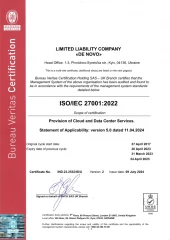
ISO / IEC 27001 Certificate of compliance Ukraine and Europe Clouds
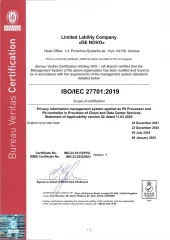
ISO / IEC 27701 Certificate of compliance
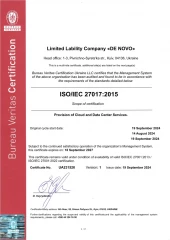
ISO / IEC 27017 Certificate of compliance
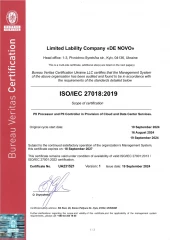
ISO / IEC 27018 Certificate of compliance
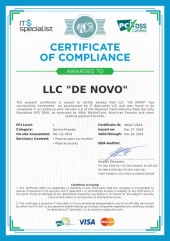
Data center compliance with PCI DSS requirements
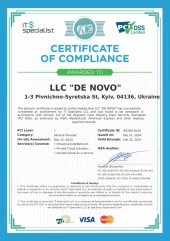
Cloud compliance with PCI DSS requirements
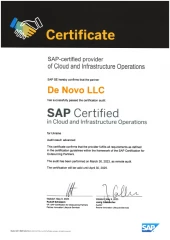
SAP Certified in Cloud and Infrastructure Operations

HPI Infrastructure Government Certificate of compliance

KSZI Certificate for Cloud Service Management Systems

IaaS / PaaS cloud services KSZI certificate
Get a consultation
Cloud services — Q&A
Information is today one of the most valuable assets of businesses, non-profit organizations, and government institutions. The demand for convenient, flexible, and reliable IT solutions is growing with acceleration from year to year. Therefore, cloud technologies continue to conquer the market confidently, helping users optimize costs, increase productivity, and scale business.
Who is a cloud provider?
A cloud provider is a specialized company that provides access to computing resources, software, and even entire software platforms and services via the Internet. This means that users of cloud services do not need to invest in purchasing, maintaining, and maintaining on-premise equipment, software licenses, hiring expensive IT specialists, etc. A cloud provider with equipment performs all these tasks in one or more data centres. At the same time, if there is a communication channel, the user can access cloud IT resources from anywhere in the world, paying for them as they are used. This, in particular, means that the client can minimize capital expenditure and transfer CAPEX to OPEX.
Unlike hosting providers specialising in hosting websites on their servers, cloud providers offer a much more comprehensive range of features and services. There are three main models of providing cloud services:
IaaS (Infrastructure as a Service) — remote rental of virtual servers, data storage, networks and other IT resources.
PaaS (Platform as a Service) is an on-demand platform for developing and deploying applications.
SaaS (Software as a Service) — access to software in the cloud via the Internet.
Each model will be optimal for different business tasks, but increasingly, companies and organizations rely on a combination of these approaches in their activities. Within the general models of IaaS, PaaS, and SaaS, hundreds of specialized services provided by cloud service providers have been developed.
What are the advantages of cloud technology for business?
Cloud providers provide cloud services on the "as a service" model. This means that users can access these services anytime, anywhere, and at any volume, paying only for the resources used. This approach provides flexibility and cost savings.
Why do businesses choose cloud technologies? Mainly because they provide several significant benefits, such as reduced capital investment, as there is no need to purchase and maintain expensive equipment. Cloud scalability allows you to quickly and easily increase or decrease resources according to changing business needs, and the ability to work from anywhere in the world (with Internet access) provides significant flexibility when working with IT infrastructure. It is also worth noting such benefits as increased productivity, cost optimization (paying only for used resources), simplifying the deployment of IT infrastructures and increasing their reliability, reducing downtime (high availability and fault tolerance), increasing the mobility of employees and improving interaction between them.
Choosing a cloud provider - what should you pay attention to?
To choose a cloud service provider (or IaaS provider, PaaS provider), first of all, pay attention to such factors as:
- List of available services, their relevance and relevance to your business needs
- Cost of services
- Guaranteed level of security and fault tolerance of the cloud IT infrastructure
- Scalability — the ability to expand resources in the future
- Reviews of other users
- The level of SLA (Service Level Agreement) — what are the guarantees of the quality of services provided
- Compliance with legal requirements, for example, in the field of confidential data protection
- Providing technical support to clients
- Availability of profile certificates from state bodies, global manufacturers and trusted international organizations
Cloud technologies continue to develop dynamically, opening ever-wider opportunities for business. Moving to the cloud allows companies to optimize costs, increase productivity, and respond more quickly to constant market changes.




















